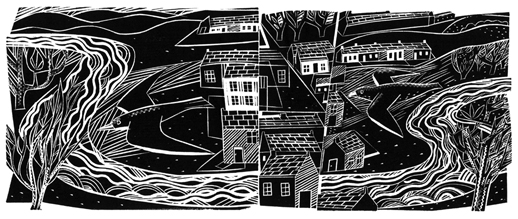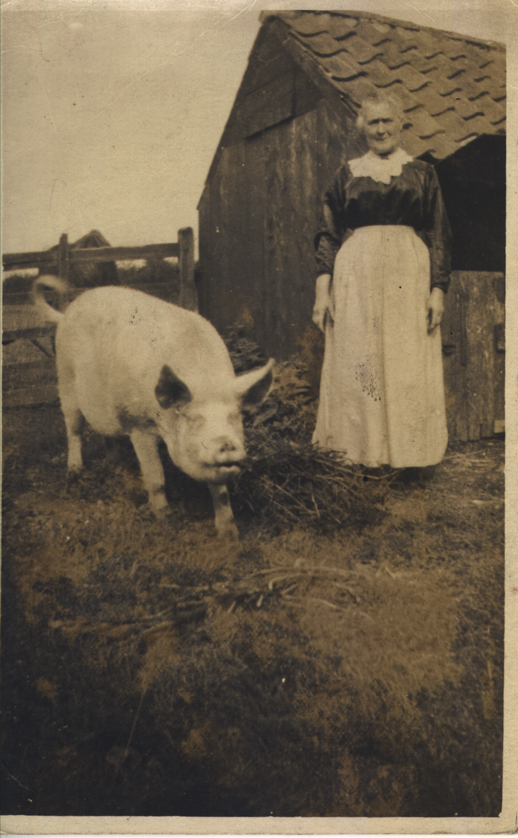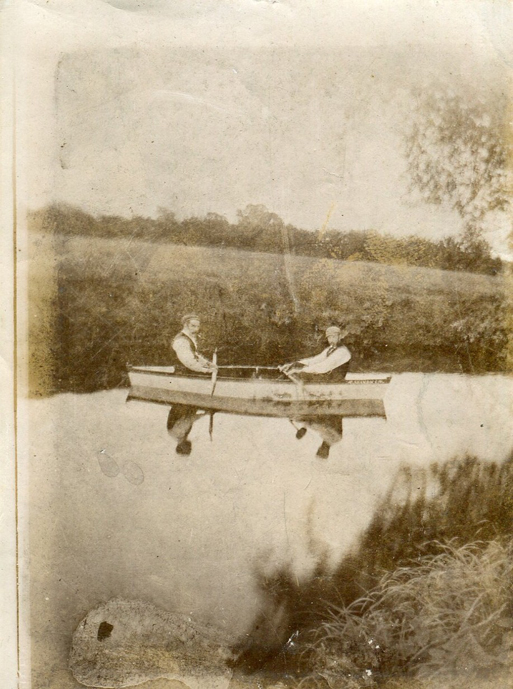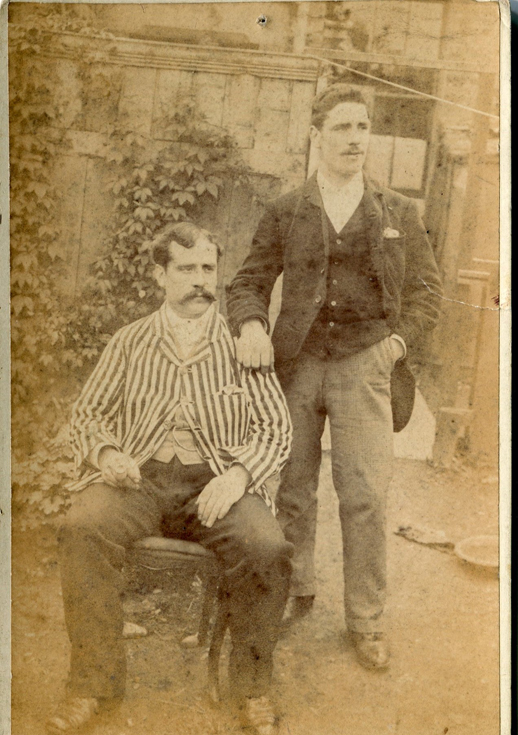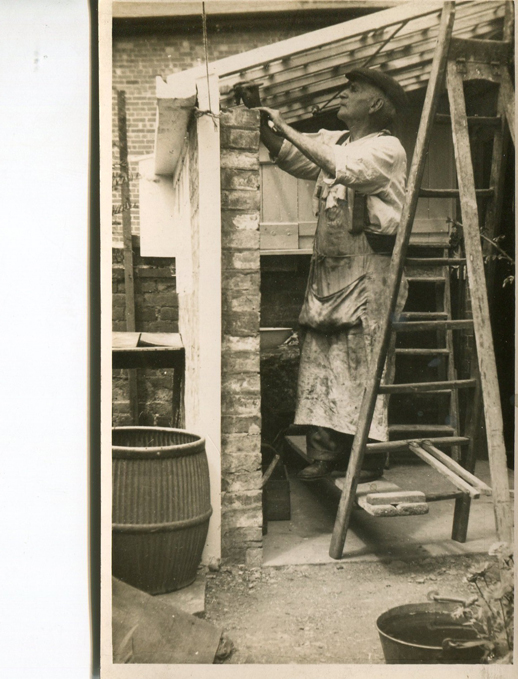Illustration by Jonathan Gibbs
Words by Neil Sentance
1919: Old Bones
The river was still and black. It was late September now and the summer had been packed away with the last of the apples. A fog was skulking in from over the mudstones of the Vale of Belvoir, thin and watery and secluding.
Charles Chalk was smiling as he leant on the creaking gate, Toby, his terrier, watchful at his side. He had changed out of his decorating overalls, and looked dapper in a pressed white Irish linen shirt, black corduroy jacket and trilby hat. Pipe smoke swirled into his eyes and his thick grey moustache twitched as he moved the stem along with his teeth. He was watching the lame horse in the paddock by the riverside, a chestnut mare with some dappling at the withers. The horse was gamely cantering despite her bony spavins, steam rising off her back. Some late-leaving swifts were screeching over the field, flying low on the feed, avoiding the mare, but agitating her enough to make her lumber towards the riverbank. Charles’s wife Amy, still in her work smock, her white hair swept back, her hands gnarled and arthritic, was uttering soft injunctions while she threw kitchen slops in the direction of the old sow they called Lizzy, who was rootling outside the shed.
Charles remembered how Chris, he and Amy’s eldest, had always been a good hand with the animals. As a small boy he’d rig up the goat to pull the child’s carriage Charles had built for him one Christmas, and career round the lanes and up to the churchyard, where the goat would chomp wayside burdock and cow parsley. It had been Chris who had tended the farm horses, staying up all night with the skewbald that had pneumonia one moonless February. He’d known all the names of the birds and riverside blooms and insects skittering on the surface or on the wing. Sunny Sundays Charles and Chris would row down the Witham, do some idle fishing between smokes in the boat they had built together and named the Shamrock, a sleek, deep green skiff, knocked up between sessions building the coffins that as village undertakers they were often called on to make.
Charles had had Chris on his mind all day, a day of grim anniversary. The war had been over for ten months, but Chris would never make old bones. He had long been lying in Dud Corner, a cemetery in the Pas-de-Calais, named for the host of unexploded enemy shells found there. He had joined the cavalry at the war’s start, but a farm boy’s disgust at the treatment and slaughter of the horses had led to his transfer to the infantry. He had been killed on the second day of the battle of Loos on 26 September 1915, drowned in a brutal haze of chlorine gas, four years ago to the day. He never met his infant son Ron, born weeks after his death.
The day was falling away as the mists rolled in. Clouds the texture of sifted flour rumbled across the western sky. Charles shuffled off to the barn to paint in oils, a small canvas for his own pleasure, as he did most evenings. Landscapes were his chosen form – he would sit and recall the soft folds of his Hampshire youth, the pebbly chalk streams, the abundant woodlands, the homely fields. He always painted a version of the same scenes, culled from the memory of the walk from his home near Southampton to London in 1877. He had been seventeen years old, and not the first to stride out towards the clamouring city, or the last. His father, who had never held out hopes for his son’s prospects, gave him sixpence for the trip and didn’t wait at the door to see him off. Charles marched out one midsummer morning, a crust of bread in his pocket and a bag of tools on his back, sleeping in haylofts on the way, earning small change from doing odd jobs on downland farms, a cheery vagabond. He relished the nights, alone after years in his folks’ briny, cramped cottage near the docks of Southampton Water. He thought back now to those nights, spent scanning the skies, the old shambling cavalcade of stars, fuel of pure hopes, limitless desires, moments rich with shining possibilities.
London, of course, had been full of wonder and dubious bargains, as it always had and will be. Soon enough he found himself apprenticed to a firm of Putney painters and decorators, and it had been while learning his trade that he’d met Amy Harrison, daughter of a Lincolnshire shepherd and now in service as the laundress in a grand house next to the Thames. They married in the spring of 1883 and lived in Fulham for some years, where their two boys, Chris and Frank, were born. Then in 1887, Amy’s father died of appendicitis. Amy and Charles appealed to the landlord, the earl of Ancaster, to take over the tenancy of her father’s small farm at Kirkby Underwood on the Rippingale Fen, south Lincolnshire. But the landowner would not countenance such an agreement with the mere daughter of his tenant and Charles and Amy and family were forced to find lodging in town, where Charles once again set up as house decorator. Eventually, they had saved enough to buy their own smallholding with a bankside garden, ten miles downriver, where the Witham begins its curve north through the clayey Trent Vale.
Charles opened the tall wooden doors to the barn and inched past the two-wheeled trap and into his workshop. He lit the stove and sat easily at the grooved bench. The back of the wormy timber door was daubed with colour tests, the paints he’d mixed from white bases and a panoply of chalky pigments for the walls of a humble kitchen or a grand drawing room – he was known to be able to match any shade, often brought to him on patches of cloth or old china pots. He turned to the canvas, a sketch of a small lonely cottage on the edge of a cornfield, in the style of Samuel Palmer or John Constable. He drew on his pipe and his mind wrapped around the concept of negative space, the line where air meets the hard edge of what is real, the marbled end-paper sky above the cottage in his painting. After a while, his pipe went out as his thoughts came back to Chris, off in that far country.
